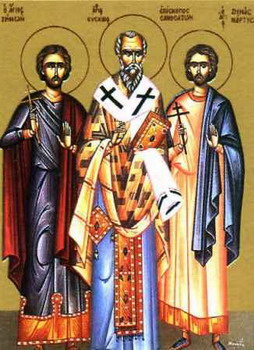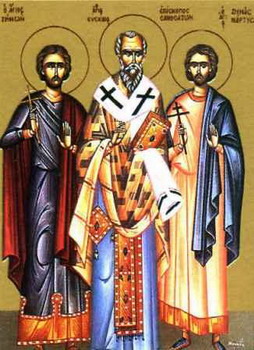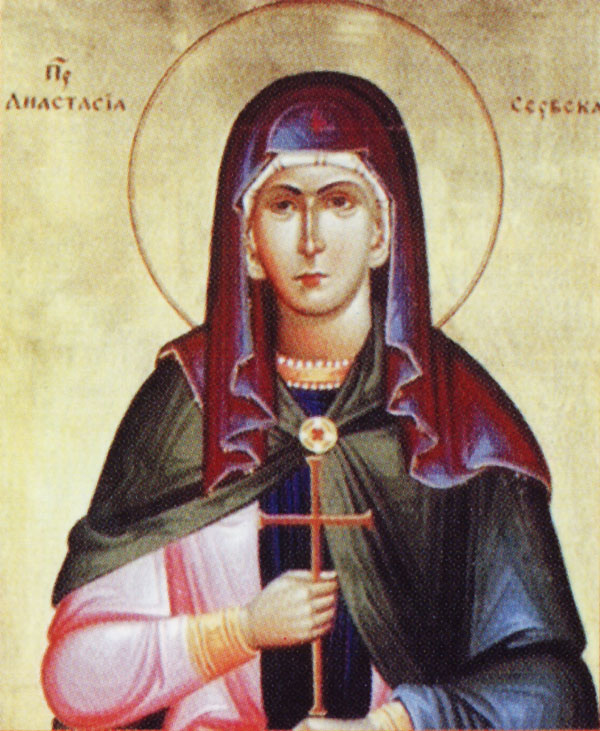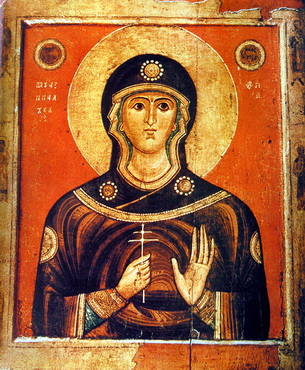|
|
The Hieromartyr Eusebius, Bishop of Samosata He was a major opponent of Arianism. When the patriarchal throne of Antioch became vacant, Meletius was elected Patriarch. This Meletius was a shining light in the Church, and deserved the great eulogy given by St John Chrysostom at his death. But the Arians soon drove Meletius from Antioch. When Constantius, Constantine's evil son, died, he was followed by Julian the Apostate, a man even worse than he, as ruler of the Empire. During Julian's persecution of Christians, St Eusebius took off his cassock, clad himself in soldier's garb and travelled around the persecuted churches of Syria, Phoenicia and Palestine, strengthening the Orthodox faith everywhere and creating the necessary priests, deacons and other clergy and raising some to the episcopate. After the news of Julian's death, St Eusebius advised Meletius to summon a Council of the Church in Antioch. This took place in 363, and the twenty-seven hierarchs present denounced Arianism once again and proclaimed the Orthodox faith as it was expressed at the First Ecumenical Council. Besides Meletius and Eusebius, St Pelagius of Laodicea, a man of great asceticism and chastity, made a great impact at this Council, which took place during the reign of the devout Emperor Jovian. But he died soon after, and the evil Valens took the throne, and the persecution of Orthodoxy began afresh. St Meletius was banished to Armenia, Eusebius to Thrace and Pelagius to Arabia. After Valens, the Emperor Gratian came to the throne and restored freedom to the Church, returning the exiled bishops to their rightful places: Meletius to Antioch, Eusebius to Samosata and Pelagius to Laodicea. Many dioceses were vacant at that time and Eusebius was quick to find canonical pastors for the people. But when he arrived at the city of Doliche with the newly chosen bishop, Marinus, to install him as bishop and denounce the Arlan heresy (which was strong in that city), a certain fanatical heretic threw a tile from the roof and gave him a mortal wound. This great zealot for Orthodoxy, this saint and martyr, died and entered into eternal life in the blessedness of Paradise in the year 379. He was a major opponent of Arianism. When the patriarchal throne of Antioch became vacant, Meletius was elected Patriarch. This Meletius was a shining light in the Church, and deserved the great eulogy given by St John Chrysostom at his death. But the Arians soon drove Meletius from Antioch. When Constantius, Constantine's evil son, died, he was followed by Julian the Apostate, a man even worse than he, as ruler of the Empire. During Julian's persecution of Christians, St Eusebius took off his cassock, clad himself in soldier's garb and travelled around the persecuted churches of Syria, Phoenicia and Palestine, strengthening the Orthodox faith everywhere and creating the necessary priests, deacons and other clergy and raising some to the episcopate. After the news of Julian's death, St Eusebius advised Meletius to summon a Council of the Church in Antioch. This took place in 363, and the twenty-seven hierarchs present denounced Arianism once again and proclaimed the Orthodox faith as it was expressed at the First Ecumenical Council. Besides Meletius and Eusebius, St Pelagius of Laodicea, a man of great asceticism and chastity, made a great impact at this Council, which took place during the reign of the devout Emperor Jovian. But he died soon after, and the evil Valens took the throne, and the persecution of Orthodoxy began afresh. St Meletius was banished to Armenia, Eusebius to Thrace and Pelagius to Arabia. After Valens, the Emperor Gratian came to the throne and restored freedom to the Church, returning the exiled bishops to their rightful places: Meletius to Antioch, Eusebius to Samosata and Pelagius to Laodicea. Many dioceses were vacant at that time and Eusebius was quick to find canonical pastors for the people. But when he arrived at the city of Doliche with the newly chosen bishop, Marinus, to install him as bishop and denounce the Arlan heresy (which was strong in that city), a certain fanatical heretic threw a tile from the roof and gave him a mortal wound. This great zealot for Orthodoxy, this saint and martyr, died and entered into eternal life in the blessedness of Paradise in the year 379.The Holy Martyrs Zeno and Zenas St Zeno was a Ronian officer in the Arabian city of Philadelphia, and Zenas was his servant. When a persecution of Christians began during the reign of the Emperor Maximian, St Zeno stepped boldly before the governor, Maximus, and confessed his faith in the one, living God, counselling Maximus to give up dead idols and accept the one, true Faith. The governor was outraged and threw Zeno into prison. When the faithful Zenas visited his master in the prison, he too was seized and imprisoned. The two were thereupon tortured for Christ and finally thrown into the flames, which the pagans brought to a great heat with oil. Their souls were crowned in the Kingdom of Christ while their mortal remains were buried in the Church of St George at a place called Cyparisson.
St Alban is commemorated on August 23rd. St Zeno was a Ronian officer in the Arabian city of Philadelphia, and Zenas was his servant. When a persecution of Christians began during the reign of the Emperor Maximian, St Zeno stepped boldly before the governor, Maximus, and confessed his faith in the one, living God, counselling Maximus to give up dead idols and accept the one, true Faith. The governor was outraged and threw Zeno into prison. When the faithful Zenas visited his master in the prison, he too was seized and imprisoned. The two were thereupon tortured for Christ and finally thrown into the flames, which the pagans brought to a great heat with oil. Their souls were crowned in the Kingdom of Christ while their mortal remains were buried in the Church of St George at a place called Cyparisson.
St Alban is commemorated on August 23rd.Venerable Anastasia of Serbia Saint Anastasia was the mother of St Sava of Serbia (January 12). She was the daughter of the Byzantine Emperor Romanus, and received the name Anna when she was baptized. Later, she married the Serbian king Stephen Nemanya (September 24).
She finished her life as a nun, receiving the name Anastasia. Saint Anastasia was the mother of St Sava of Serbia (January 12). She was the daughter of the Byzantine Emperor Romanus, and received the name Anna when she was baptized. Later, she married the Serbian king Stephen Nemanya (September 24).
She finished her life as a nun, receiving the name Anastasia. Martyr Pompian
Martyr GalacteonSaint Galaction was drowned in the sea for confessing faith in Christ
Martyrs Juliana and Saturninus of Constantinople Saint Juliania together with her son Saturninus was burnt. Saint Juliania together with her son Saturninus was burnt. |